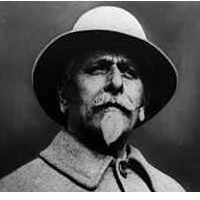 Petri was living on the fringes of Tatavla. The early life of Zaharoff gives a good indication of the opprtunistic life style and street smarts of the time.
Petri was living on the fringes of Tatavla. The early life of Zaharoff gives a good indication of the opprtunistic life style and street smarts of the time.Sir Basil Zaharoff, originally Zacharias Basileios, (1849, Muğla, Turkey - 1936, Monte Carlo, Monaco) was a Greek-Russian arms trader and financier, the director and chairman of the Vickers-Armstrong munitions firm during the World War I. It was said that he fuelled conflicts in order to sell weapons to both sides.
Early life
Basil was from a Greek family in Constantinople. The name Zaharoff was adopted when the family was in exile in Russia as a result of the anti-Greek Easter pogroms (1)of 1821. The family returned to Turkey in the 1840s and lived in the Anatolian town of Muğla. By 1855 the family was back in Constantinople where they lived in the poor quarter of Tatavla where Basil was a street kid.
Little Basil’s first job was as a guide for the tourists to the Galata, or prostitution district of Constantinople, helping his clients to find the forbidden pleasures that went beyond the bounds of normal prostitution. He was then to become a fireman. The 19th century firemen of Constantinople were not at all effective at extinguishing fires, but were quite effective at rescuing the treasures of the rich for a healthy commission. Many also engaged in protection rackets and outright robbery.
Basil then took on the job of a money changer. In this career there is an unverified accusation that he would pass counterfeit currency to tourists who would not notice until they were safely on a boat steaming away from Constantinople
(1) A pogrom (from Russian: meaning "wreaking of havoc") is a massive violent attack on a particular ethnic or religious group with simultaneous destruction of their environment (homes, businesses, religious centers). The term has historically been used to denote massive acts of violence, either spontaneous or premated, against Jews, but has been applied to similar incidents against other minority groups. Massive violent attacks against Jews date back at least to the Crusades or earlier, but the first pogrom is often considered to be the 1821 anti-Jewish riots in Odessa after the death of the Greek patriarch in Constantinople, in which 14 Jews were killed. St Gregory V, Archbishop of Constantinople, occupied the Patriarchal throne three times (1797-1799, 1806-1808, 1819-1821 AD). On the day of Holy Pascha, April 10, 1821 AD, St Gregory was hanged before the doors of the Patriarchate. Those doors have remained shut since that day. After three days, the Saint's body was sold to a Jewish mob, who dragged his body through the streets, then threw it into the sea.

No comments:
Post a Comment